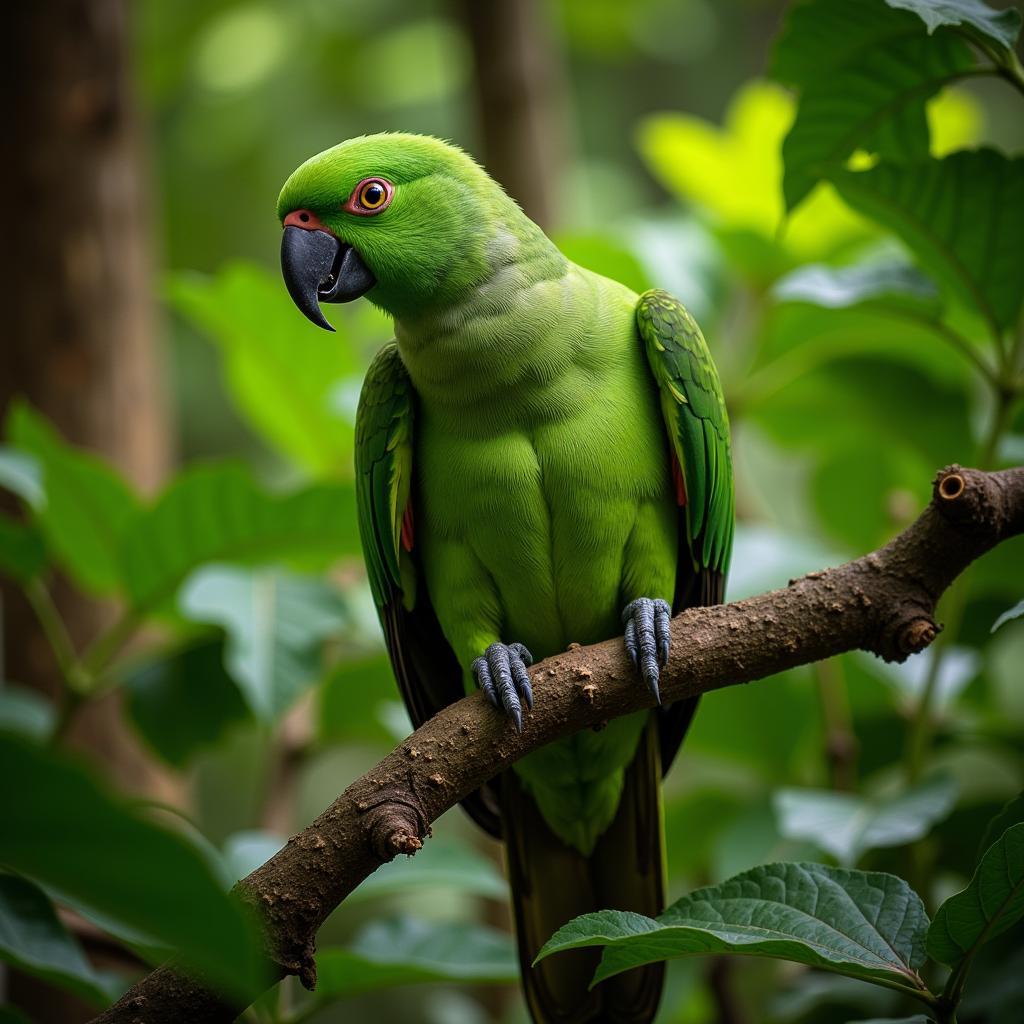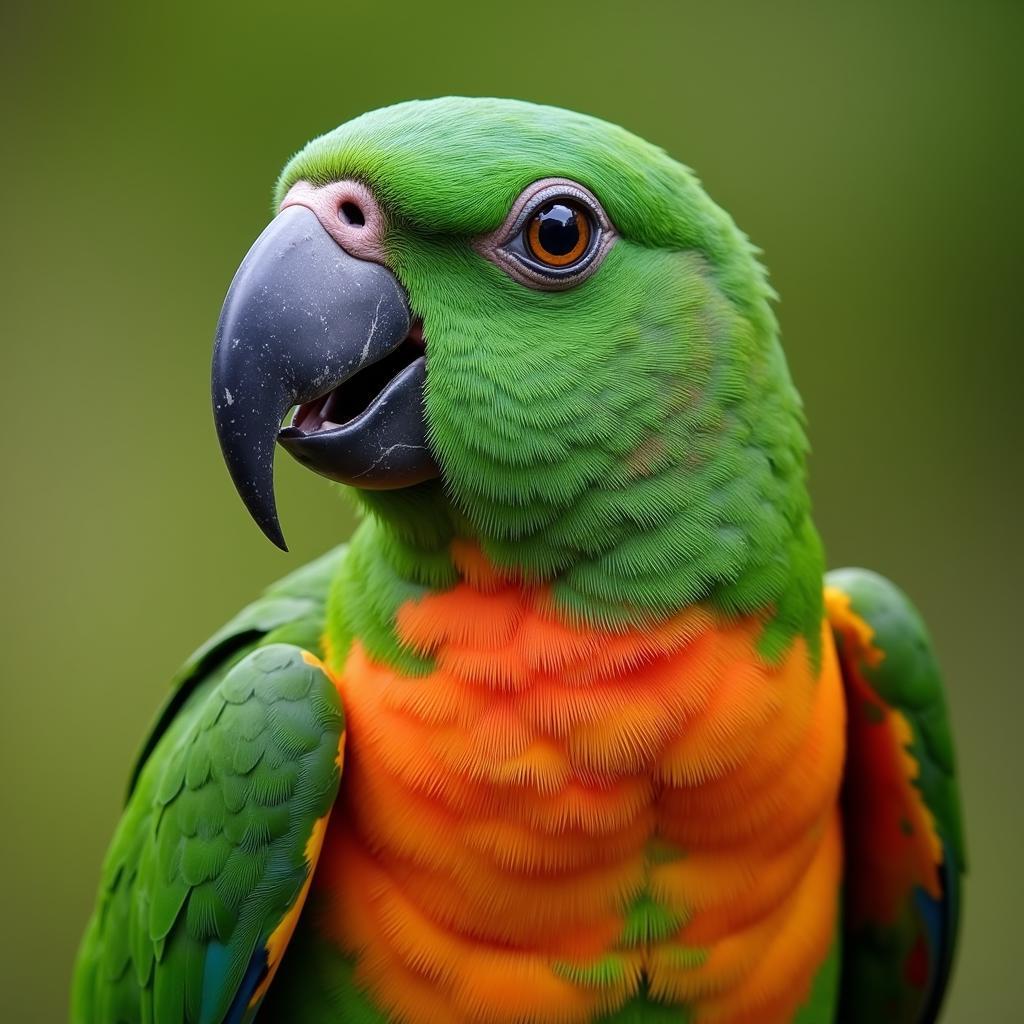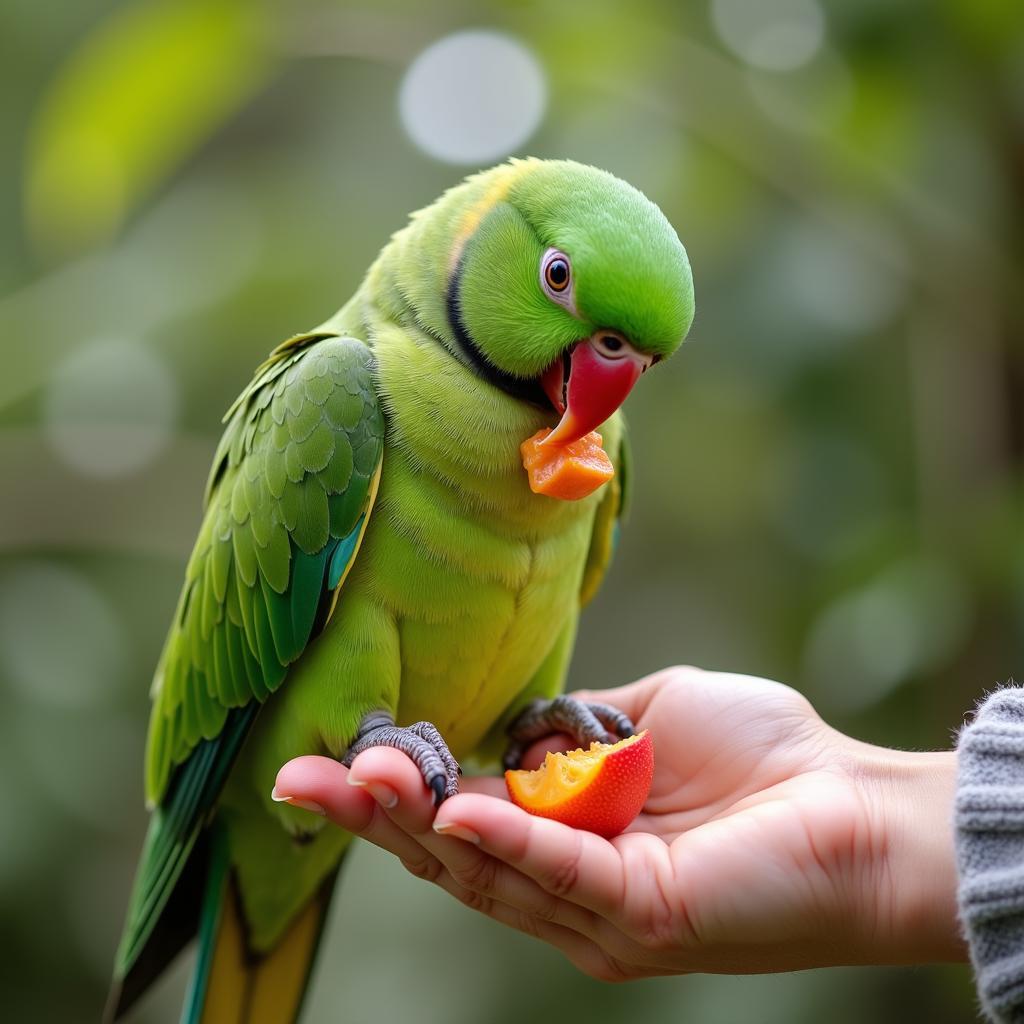The African Green Neck Parrot: A Complete Guide
The African Green Neck Parrot, also known as the Senegal parrot (Poicephalus senegalus), is a popular pet choice for bird lovers. Its small size, playful personality, and striking beauty make it a fascinating companion. This comprehensive guide will delve into everything you need to know about this charming species, from its natural habitat to its dietary needs and care requirements.
Origin and Habitat of the African Green Neck Parrot
 African Green Neck Parrot in Natural Habitat
African Green Neck Parrot in Natural Habitat
As their name suggests, African green neck parrots are native to the African continent. Their range stretches across a wide band of West Africa, from Senegal and Gambia in the west to Cameroon and Chad in the east. These parrots thrive in various habitats, including savannas, woodlands, and forests, showcasing their adaptability. They are highly social birds and are often found in flocks of up to 20 individuals.
Physical Characteristics: A Closer Look
 African Green Neck Parrot Physical Characteristics
African Green Neck Parrot Physical Characteristics
African green neck parrots are relatively small parrots, measuring between 9-10 inches in length and weighing approximately 120-170 grams. Their most distinguishing feature is their gray head, which contrasts beautifully with their bright green body. They have a short tail and a stout build. Mature males and females are visually similar, making it challenging to determine their sex based on appearance alone.
These parrots also possess a vibrant orange-red patch on their belly, a characteristic that varies in size and intensity depending on the individual. Their strong, hooked beaks are designed for cracking seeds and nuts, their primary food source in the wild.
African Green Neck Parrots as Pets: Personality and Temperament
 African Green Neck Parrot Interacting with Owner
African Green Neck Parrot Interacting with Owner
African green neck parrots are known for their playful and affectionate personalities, making them delightful companions. They are intelligent birds, capable of learning tricks and mimicking sounds. However, they are also known for their independent streaks and can become bored easily.
Early socialization is crucial for these parrots. Proper handling and exposure to various stimuli from a young age help them develop into well-adjusted companions. When their needs are met, African green neck parrots are known for their comical antics and affectionate nature.
Caring for Your African Green Neck Parrot
Providing a suitable environment and meeting their social, dietary, and enrichment needs is essential for the well-being of an African green neck parrot. Here’s a closer look at their care requirements:
- Housing: A spacious cage is a must for these active birds. It should be large enough to accommodate their toys, food and water bowls, and a comfortable perch. The cage should be placed in a well-lit area, away from drafts and direct sunlight.
- Diet: African green neck parrots thrive on a varied diet consisting of high-quality parrot pellets, fresh fruits, and vegetables. Seeds and nuts should be given in moderation as treats.
- Enrichment: These intelligent parrots need plenty of mental and physical stimulation to prevent boredom. Provide a variety of toys, such as foraging toys, puzzle toys, and chew toys, to keep them entertained.
- Socialization: African green neck parrots are social creatures and require daily interaction. Spend quality time with your parrot every day, engaging in play, training, and simply talking to them.
Health and Lifespan
With proper care, African green neck parrots can live for 20-30 years. Regular veterinary checkups are essential to monitor their health and detect any potential issues early on. These parrots are prone to certain health conditions like feather plucking and fatty liver disease. Maintaining a healthy diet, providing adequate exercise, and ensuring a stress-free environment can help prevent these problems.
Conclusion
The African green neck parrot is a captivating and rewarding pet that brings joy to countless bird enthusiasts worldwide. Their intelligence, playful demeanor, and striking beauty make them a unique and cherished companion. By understanding their needs and providing them with the care they deserve, you can ensure a long, healthy, and fulfilling life for your feathered friend.
If you are considering welcoming an African green neck parrot into your home, remember to purchase from a reputable breeder or rescue organization to ensure you are getting a healthy and well-socialized bird. Prepare for a rewarding journey filled with laughter, companionship, and the undeniable charm of the African green neck parrot.
FAQs About African Green Neck Parrots
Q: Are African green neck parrots good talkers?
A: While not as renowned for their talking abilities as some larger parrot species, African green neck parrots can learn to mimic words and phrases.
Q: How can I tell if my African green neck parrot is happy?
A: Signs of a happy parrot include playful behavior, bright eyes, a relaxed posture, and gentle vocalizations.
Q: Can African green neck parrots live with other birds?
A: While they can co-exist with other birds in the wild, it’s generally not recommended to house African green neck parrots with other species in captivity.
Q: How much does an African green neck parrot cost?
A: The price of an African green neck parrot can vary depending on the breeder, lineage, and age. On average, you can expect to pay between $500 to $1000.
Q: Are African green neck parrots cuddly?
A: Many African green neck parrots enjoy being petted and scratched by their owners, but the level of cuddliness varies between individuals.
Learn more about other fascinating birds:
- Explore the world of African love birds variety
- Discover the diverse creatures on the African jungle animals list
- Delve into the captivating world of African lovebirds
Need Help?
For any assistance or inquiries, contact us via:
Phone: +255768904061
Email: kaka.mag@gmail.com
Address: Mbarali DC Mawindi, Kangaga, Tanzania
Our dedicated customer support team is available 24/7 to assist you.
